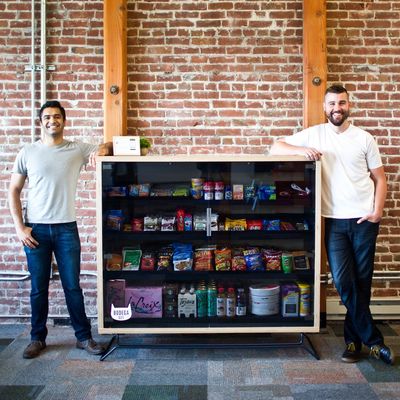
Tech Twitter spent this morning roasting a San Francisco start-up called Bodega, which aims to one-up the corner deli by installing a small dispensary, selling perhaps 75 products, in your building’s lobby. The criticism ran far and fast after Fast Company profiled the two ex-Googlers behind the idea. Among the knocks: “Bodega,” the name, is appropriative. Bodega, the company, aims to destroy (sorry, “disrupt”) solid little businesses. It is anti-immigrant. The list of items seems sexist. The logistics will doom this outfit anyway, which is basically (as my colleague Madison Malone Kircher notes) just reinventing the vending machine. And won’t someone think of the future of the bodega cat? Wasn’t the Slurpee assault bad enough?
Why did this set off such a furor, though? Well, because bodegas (I use the term alongside “corner deli” here, though I’ll stipulate that there are distinctions between the two that are worth preserving) deserve defending. In walkable cities, corner groceries serve particular functions that are not only vital but extremely complex. Given New York City’s very small apartments and smaller kitchens, many residents do not have large pantries, and cannot keep a stock of much on hand. (A lot of New Yorkers tend to treat Costco as they do Yellowstone National Park: with wide-eyed wonder, and a dawning awareness that other parts of the world are very different from ours.) I used to live in a studio that had only an under-counter fridge, like a dorm room’s, and exactly two shelves in the kitchen. I could not own more than a six-pack of any beverage at a time. Essentially, the deli refrigerated case functioned as one large fridge for the entire block. It was not Uber-but-for anything; it was (sorry) Zipcar but for cold drinks.
I have since moved to another apartment, but today, my local deli is literally the same distance from my couch as the garage would be in a largish McMansion. It’s about 75 steps to get a bottle of seltzer or an egg sandwich or a pint of ice cream. But in fact the deli does quite a bit more than that. You can, in a pinch, make a pretty decent dinner out of the stuff it sells. Admittedly, not a lot of the food there would meet an Alice Waters standard, but there’s passable fresh mozzarella, cage-free eggs, nice imported candy. You wouldn’t want to eat every meal from there, perhaps, but you wouldn’t be miserable if you had to do so for a couple of weeks.
Let us also, here, acknowledge that neighborhood delis are a fundamental safety tool. In her 1961 masterpiece The Death and Life of Great American Cities, Jane Jacobs wrote about “eyes on the street,” the organic round-the-clock surveillance that healthy neighborhoods gain by accident. During the day, workers and shoppers keep a block humming; in the evening, families open their windows or sit on stoops; at night, bars and restaurants keep the sidewalk active. Especially as our neighborhoods grow wealthier, that level of observation gets harder to maintain, because late-night bars generate noise complaints, leading to NIMBY attitudes and, eventually, silent, dark streets. Nobody ever complains about the non-racket from a corner deli, which is usually open (and pretty quiet) 24 hours a day, keeping a corner well-lit.
The other Jacobean role bodegas play is that of creating forced interaction. In the narrow aisles, you have to rub elbows with neighbors, whether you like them or not, whether you have anything in common with them or not. Children, in their openness, tend to spark conversations in shared places like neighborhood stores. Particularly with other kids, which can open up the parents to talk, which in turn can sometimes lead to actual human friendship.
Defenders of Bodega have offered that this is a myopic view, that the New York bubble is not the ordinary experience, and that other cities will benefit by this newfangled not-a-vending-machine device. What the disruption mentality fails to take into account, or care about, is that the bodega ecosystem they’re stomping into is highly functional, and pretty delicate. Disrupting it would disrupt us, because if a deli loses (let’s say) 5 or 10 percent of its sales to these things, it will close. If we lose a lot of corner delis, this hard-to-live-in city would become that much harder. This is not like adding Uber as a free-market alternative to the closed-and-regulated taxi system; this is like adding Uber and getting rid of most of the cabs. And it has the potential to do that, because the economies of scale and the relentless pressure on retail are tough on bodegas. Bottled water barely saves them.
Bodega, a California start-up made by people who (I would bet) spend most of their travel time in cars, turns its back on city life. You can pad down to your apartment-building lobby in your slippers, get your warm soda or microwave popcorn, and go back upstairs. You never leave the cocoon. You never cross paths with your neighborhood weirdo, never see the beggar on the corner, never see anyone who’s not part of your co-op. It is, despite being aimed at apartment buildings, fundamentally anti-city.
Most of all, though — despite all the talk of the sharing economy — it is anti-sharing. Unlike Uber, which for all its hateability solved a problem (there’s never a taxi when you need one; medallions cost a fortune; cabs in many urban areas are old and crummy), Bodega upends a system that is actually, for all its lack of clean crisp lines, rather finely tuned. The deli, as I have said, is a communal kitchen-pantry-clearinghouse. The guy at your local bodega will, in a pinch, sign for your UPS package or hold keys for your friend. A Bodega box cannot.
Also, judging by the photos, it doesn’t sell beer. The hell with that.






























